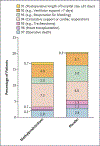Methylprednisolone for Heart Surgery in Infants - A Randomized, Controlled Trial
- PMID: 36342116
- PMCID: PMC9843240
- DOI: 10.1056/NEJMoa2212667
Methylprednisolone for Heart Surgery in Infants - A Randomized, Controlled Trial
Abstract
Background: Although perioperative prophylactic glucocorticoids have been used for decades, whether they improve outcomes in infants after heart surgery with cardiopulmonary bypass is unknown.
Methods: We conducted a multicenter, prospective, randomized, placebo-controlled, registry-based trial involving infants (<1 year of age) undergoing heart surgery with cardiopulmonary bypass at 24 sites participating in the Society of Thoracic Surgeons Congenital Heart Surgery Database. Registry data were used in the evaluation of outcomes. The infants were randomly assigned to receive prophylactic methylprednisolone (30 mg per kilogram of body weight) or placebo, which was administered into the cardiopulmonary-bypass pump-priming fluid. The primary end point was a ranked composite of death, heart transplantation, or any of 13 major complications. Patients without any of these events were assigned a ranked outcome based on postoperative length of stay. In the primary analysis, the ranked outcomes were compared between the trial groups with the use of odds ratios adjusted for prespecified risk factors. Secondary analyses included an unadjusted odds ratio, a win ratio, and safety outcomes.
Results: A total of 1263 infants underwent randomization, of whom 1200 received either methylprednisolone (599 infants) or placebo (601 infants). The likelihood of a worse outcome did not differ significantly between the methylprednisolone group and the placebo group (adjusted odds ratio, 0.86; 95% confidence interval [CI], 0.71 to 1.05; P = 0.14). Secondary analyses (unadjusted for risk factors) showed an odds ratio for a worse outcome of 0.82 (95% CI, 0.67 to 1.00) and a win ratio of 1.15 (95% CI, 1.00 to 1.32) in the methylprednisolone group as compared with the placebo group, findings suggestive of a benefit with methylprednisolone; however, patients in the methylprednisolone group were more likely than those in the placebo group to receive postoperative insulin for hyperglycemia (19.0% vs. 6.7%, P<0.001).
Conclusions: Among infants undergoing surgery with cardiopulmonary bypass, prophylactic use of methylprednisolone did not significantly reduce the likelihood of a worse outcome in an adjusted analysis and was associated with postoperative development of hyperglycemia warranting insulin in a higher percentage of infants than placebo. (Funded by the National Center for Advancing Translational Sciences and others; STRESS ClinicalTrials.gov number, NCT03229538.).
Copyright © 2022 Massachusetts Medical Society.
Figures


Comment in
-
No benefit of routine steroids in infant heart surgery.Nat Rev Cardiol. 2023 Jan;20(1):6. doi: 10.1038/s41569-022-00812-8. Nat Rev Cardiol. 2023. PMID: 36376436 No abstract available.
-
Methylprednisolone for Cardiac Surgery in Infants: Findings From a Large-scale, Randomized, Controlled Trial.J Cardiothorac Vasc Anesth. 2023 Jun;37(6):860-862. doi: 10.1053/j.jvca.2023.02.002. Epub 2023 Feb 9. J Cardiothorac Vasc Anesth. 2023. PMID: 36863987 No abstract available.
-
Methylprednisolone for Heart Surgery in Infants.N Engl J Med. 2023 Mar 9;388(10):958. doi: 10.1056/NEJMc2300127. N Engl J Med. 2023. PMID: 36884336 No abstract available.
-
Methylprednisolone for Heart Surgery in Infants.N Engl J Med. 2023 Mar 9;388(10):958-959. doi: 10.1056/NEJMc2300127. N Engl J Med. 2023. PMID: 36884337 No abstract available.
-
Methylprednisolone for Heart Surgery in Infants. Reply.N Engl J Med. 2023 Mar 9;388(10):959. doi: 10.1056/NEJMc2300127. N Engl J Med. 2023. PMID: 36884338 No abstract available.
References
-
- Jacobs JP, Mayer JE Jr, Pasquali SK, et al. The Society of Thoracic Surgeons Congenital Heart Surgery Database: 2019 update on outcomes and quality. Ann Thorac Surg 2019;107:691–704. - PubMed
-
- Ashraf SS, Tian Y, Zacharrias S, Cowan D, Martin P, Watterson K. Effects of cardiopulmonary bypass on neonatal and paediatric inflammatory profiles. Eur J Cardiothorac Surg 1997;12:862–8. - PubMed
-
- Hoffman TM, Wernovsky G, Atz AM, et al. Efficacy and safety of milrinone in preventing low cardiac output syndrome in infants and children after corrective surgery for congenital heart disease. Circulation 2003;107:996–1002. - PubMed
-
- Asimakopoulos G Systemic inflammation and cardiac surgery: an update. Perfusion 2001;16:353–60. - PubMed
Publication types
MeSH terms
Substances
Associated data
Grants and funding
LinkOut - more resources
Full Text Sources
Medical
Miscellaneous
